Induro® Reverse Transcriptase
Product information| Code | Name | Size | Quantity | Price | |
|---|---|---|---|---|---|
M0681S |
Induro Reverse Transcriptase |
4000 units ( 200000 units/ml ) | - | Unavailable in your region | |
M0681L |
Induro Reverse Transcriptase |
10000 units ( 200000 units/ml ) | - | Unavailable in your region |
Induro® Reverse Transcriptase
Experience a new class of performance with a group II intron-encoded RT.
Catalog #M0681
Product Introduction
- Highly processive RT enables fast reactions with high yields of long cDNA
- Strong inhibitor tolerance enables robust cDNA synthesis performance
- Recommended by Oxford Nanopore Technologies® for direct RNA sequencing
- Supports direct RNA sequencing and long read cDNA sequencing workflows (e.g., bioRxiv preprint)
- Increased thermostability for robust cDNA synthesis at high temperatures
- Experience comparable fidelity to retroviral RTs
- Scientific poster from London Calling
- View on demand webinars:
- Product Information
- Protocols, Manuals & Usage
- FAQs & Troubleshooting
- Citations & Technical Literature
- Quality, Safety & Legal
- Other Products You May Be Interested In
Product Information
Description
Induro Reverse Transcriptase is a group II intron-encoded RT that exhibits high processivity, increased thermostability, and increased tolerance of inhibitors in the synthesis of cDNA from RNA. It is an ideal enzyme for challenging cDNA synthesis from long transcripts, RNAs with strong secondary structures, and RNA samples with inhibitors. With improved 5' sequencing coverage of long transcripts, Induro Reverse Transcriptase can enable RNA-seq applications such as direct RNA and long read cDNA sequencing workflows.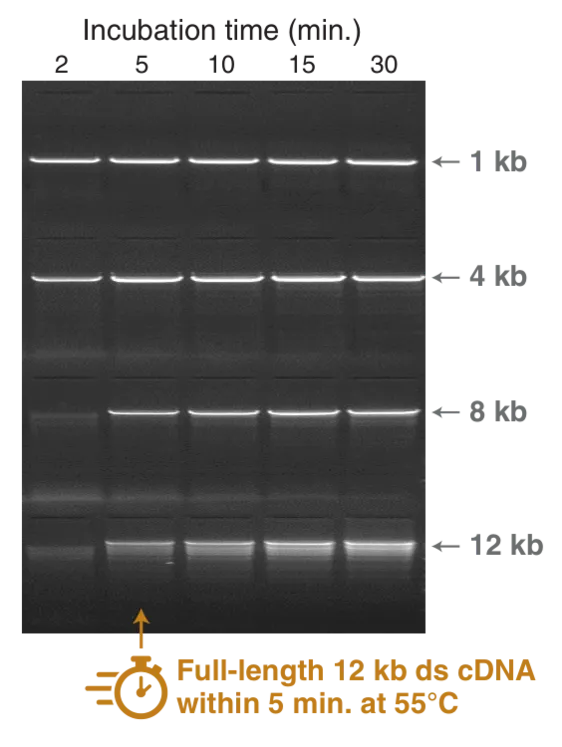
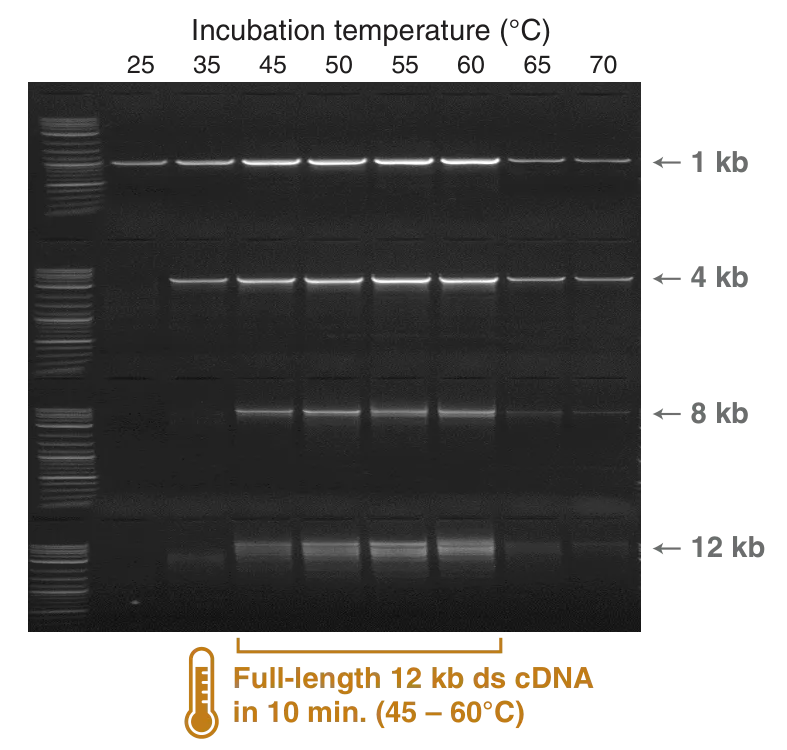
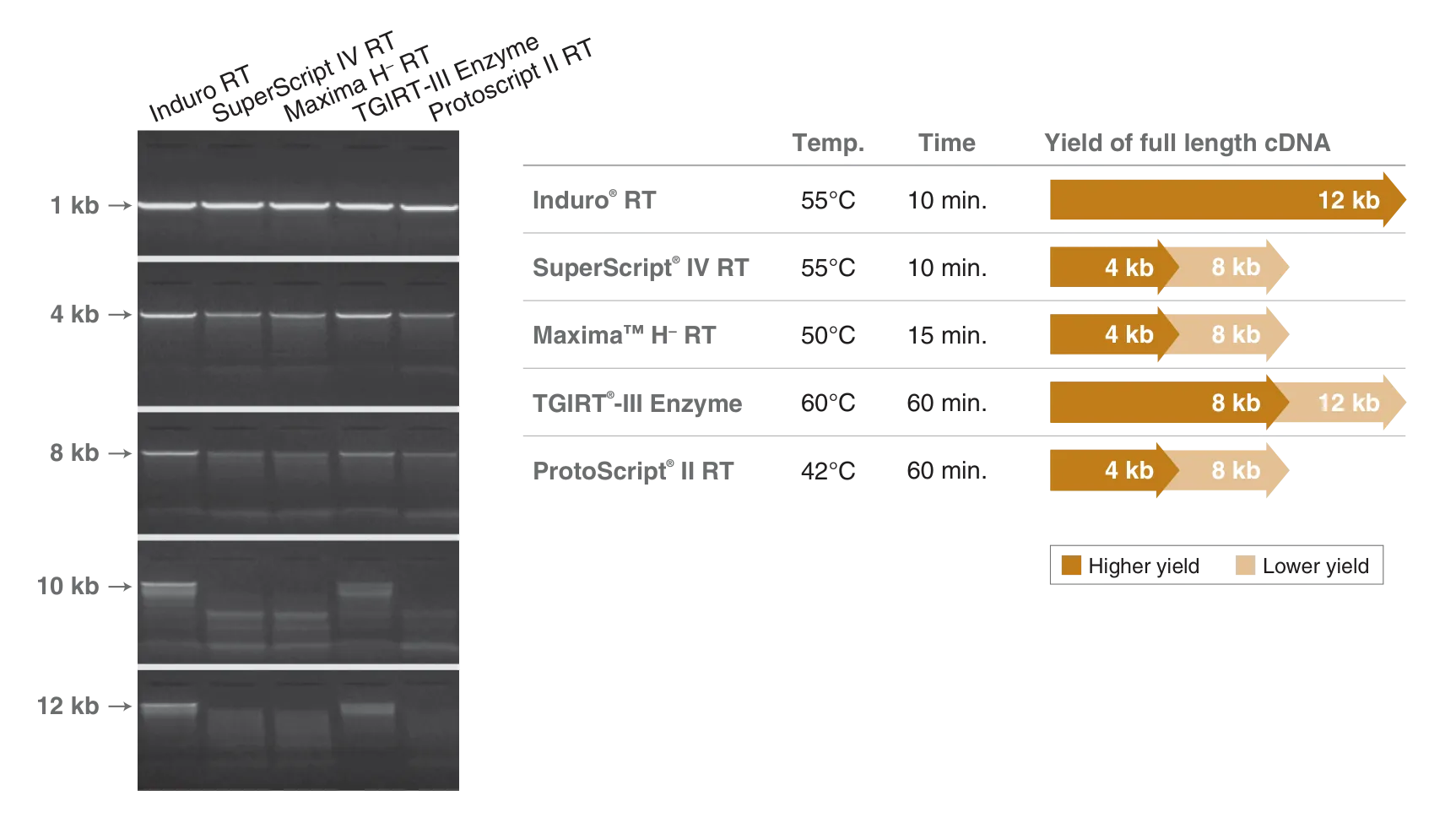
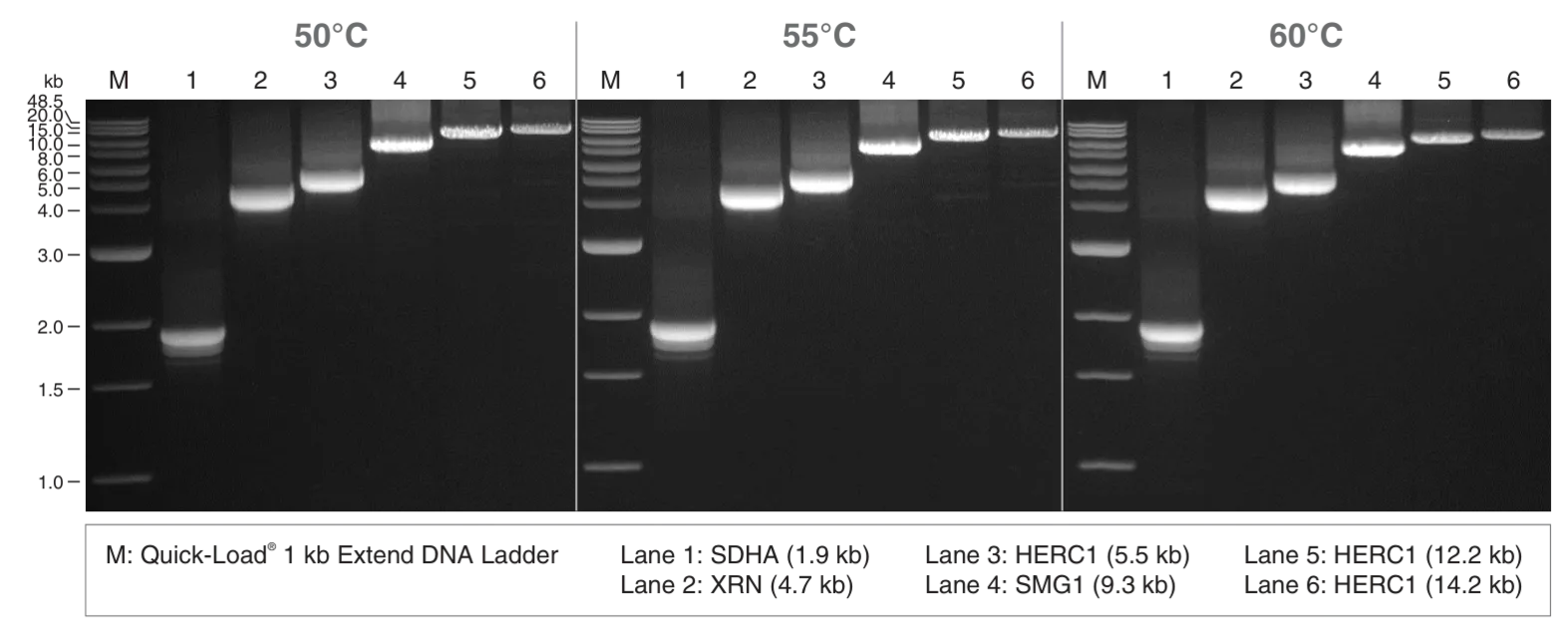
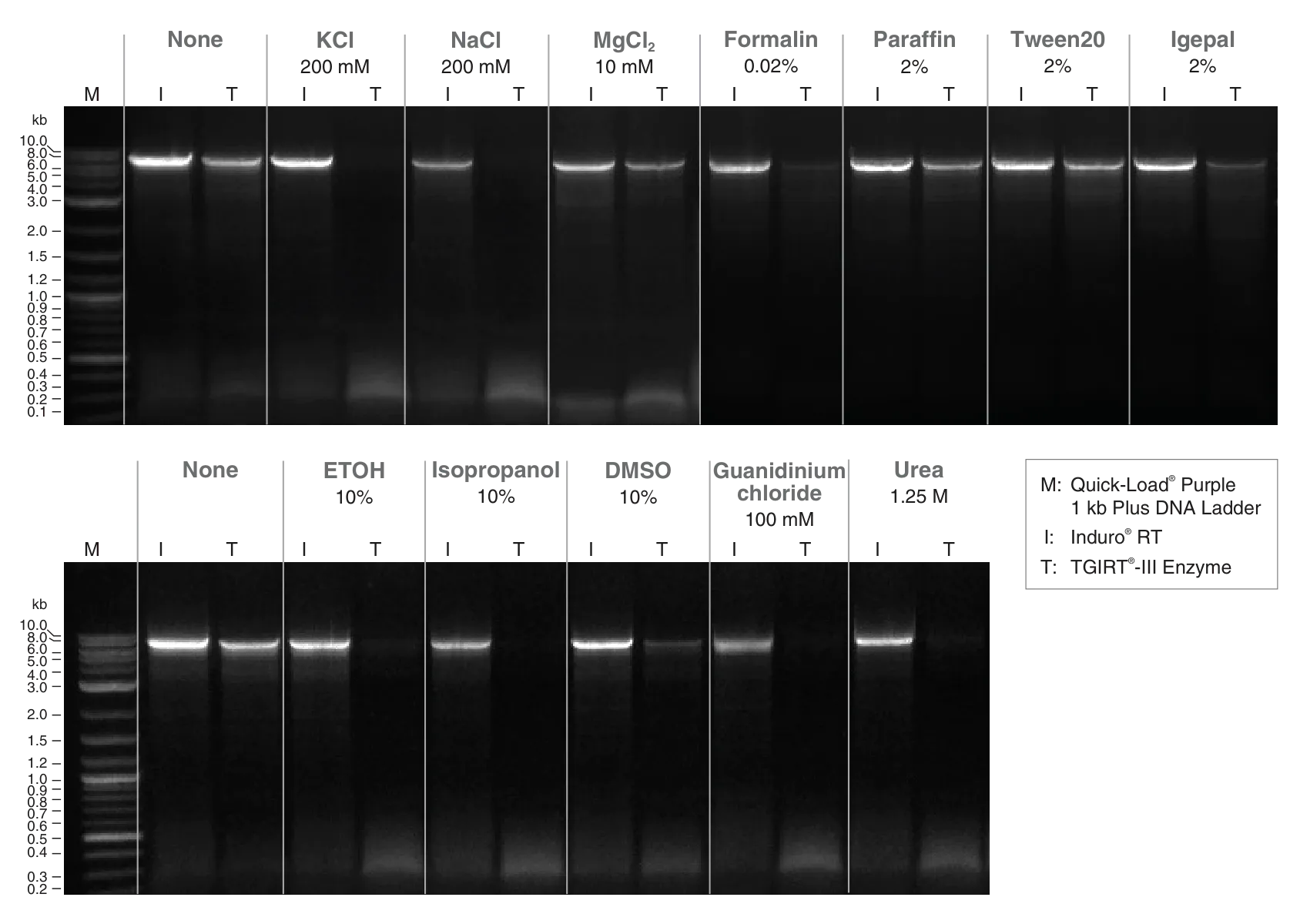
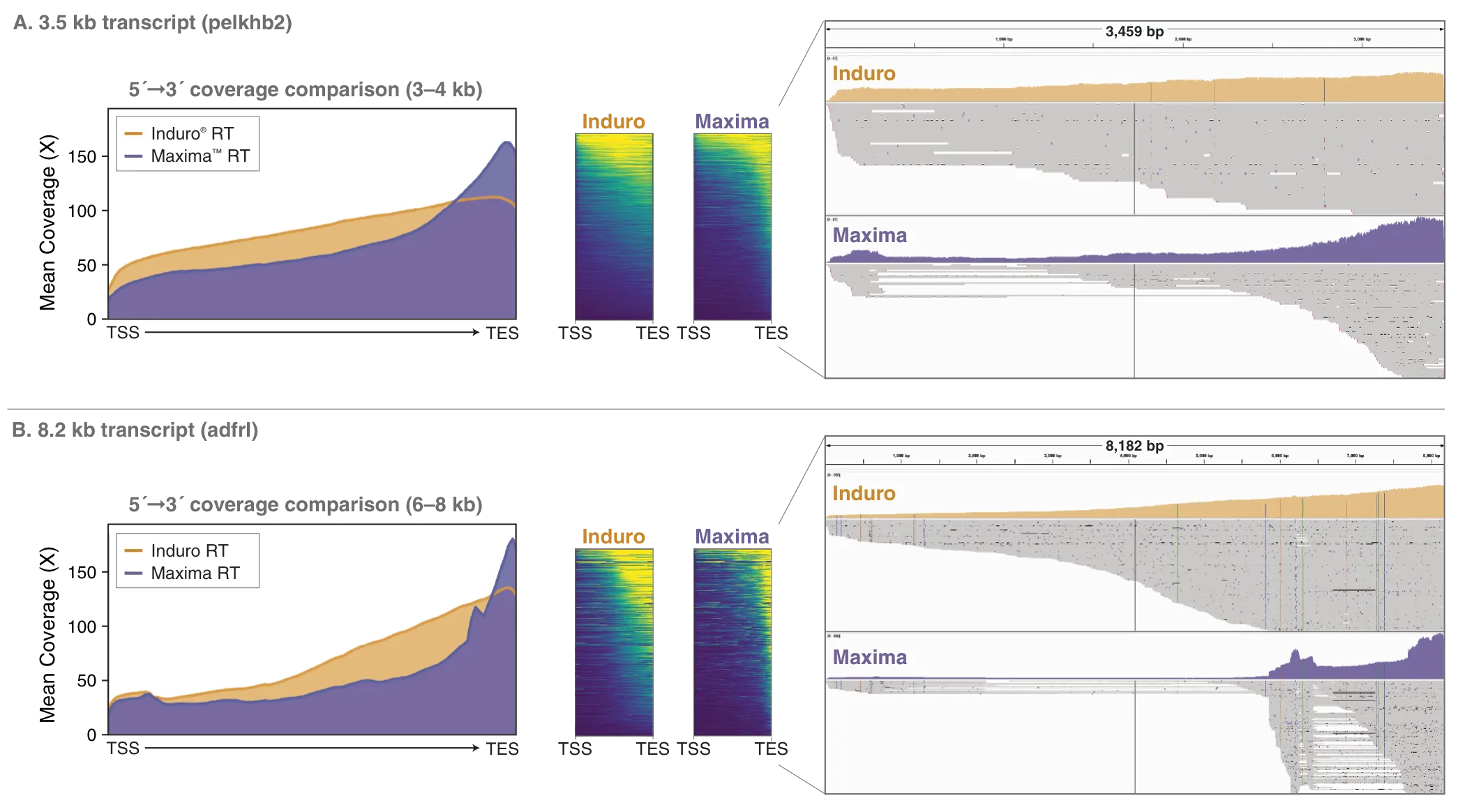
- This product is related to the following categories:
- cDNA Synthesis & Reverse Transcriptases,
- This product can be used in the following applications:
- RT-PCR,
- cDNA Synthesis,
- Reverse Transcription (cDNA Synthesis), RT-PCR & cDNA Synthesis
Properties & Usage
Materials Required but not Supplied
- Deoxynucleotide (dNTP) Solution Mix (NEB #N0447)
- RNase Inhibitor, Murine (NEB #M0314)
- Nuclease-free Water (NEB #B1500)
Related Products
Companion Products
Protocols, Manuals & Usage
Protocols
FAQs & Troubleshooting
FAQs
- What is the difference between Induro Reverse Transcriptase (NEB #M0681) and ProtoScript II Reverse Transcriptase (NEB #M0368)?
- How do I choose between Induro Reverse Transcriptase and the different LunaScript and ProtoScript products?
- Can Induro Reverse Transcriptase be used in Oxford Nanopore Technologies® direct RNA sequencing?
- What is the optimal reaction temperature for Induro Reverse Transcriptase?
- Is it possible to inactivate Induro Reverse Transcriptase?
- What is the recommended incubation time for Induro Reverse Transcriptase?
- What is the longest cDNA generated by Induro Reverse Transcriptase?
- How much Induro Reverse Transcriptase should be used in a 20 µl reaction? Can the yield be further improved by using more enzyme?
- What RNA samples are compatible with Induro Reverse Transcriptase?
- How much RNA template should I use?
- What primer should I use with Induro Reverse Transcriptase? Can I spike in gene-specific primers to the cDNA reaction?
- What applications are best for Induro Reverse Transcriptase?
- Can the cDNA products generated by Induro Reverse Transcriptase be used in real-time PCR analysis?
- What thermostable DNA polymerase can be used for PCR after cDNA synthesis?
- Why do I have low cDNA yields?
- Should I include a No-RT control reaction?
- How do I know whether my template RNA is of good quality?
- Can I store Induro Reverse Transcriptase and its reaction buffer at 4°C?
- Can I set up my cDNA synthesis reaction at room temperature when using Induro Reverse Transcriptase?
Citations & Technical Literature
Citations
Quality, Safety & Legal
Quality Assurance Statement
Quality Control tests are performed on each new lot of NEB product to meet the specifications designated for it. Specifications and individual lot data from the tests that are performed for this particular product can be found and downloaded on the Product Specification Sheet, Certificate of Analysis, data card or product manual. Further information regarding NEB product quality can be found here.Specifications
The Specification sheet is a document that includes the storage temperature, shelf life and the specifications designated for the product. The following file naming structure is used to name these document files: [Product Number]_[Size]_[Version]Certificate Of Analysis
The Certificate of Analysis (COA) is a signed document that includes the storage temperature, expiration date and quality controls for an individual lot. The following file naming structure is used to name these document files: [Product Number]_[Size]_[Version]_[Lot Number]- M0681L_v1_10163774
- M0681S_v1_10163771
- M0681L_v2_10181150
- M0681S_v2_10181151
- M0681S_v2_10193696
- M0681L_v2_10196304
- M0681L_v2_10203121
- M0681L_v2_10208069
- M0681S_v2_10207349
- M0681S_v2_10219596
- M0681L_v2_10219595
- M0681L_v2_10230848
- M0681S_v2_10230847
- M0681S_v2_10239922
- M0681L_v2_10246683
- M0681S_v2_10252426
- M0681L_v2_10252428
- M0681S_v2_10256349
- M0681L_v2_10256529
- M0681S_v2_10256914
- M0681L_v2_10263561
- M0681S_v2_10263562
- M0681S_v2_10272644
- M0681L_v2_10272643
- M0681S_v2_10279039
- M0681L_v2_10281470
- M0681S_v2_10281885
- M0681L_v2_10291238
- M0681S_v2_10292564
- M0681S_v2_10301215
- M0681L_v2_10300331
Safety DataSheets
The following is a list of Safety Data Sheet (SDS) that apply to this product to help you use it safely.Induro® Reverse Transcriptase
Legal and Disclaimers
Products and content are covered by one or more patents, trademarks and/or copyrights owned or controlled by New England Biolabs, Inc (NEB). The use of trademark symbols does not necessarily indicate that the name is trademarked in the country where it is being read; it indicates where the content was originally developed. The use of this product may require the buyer to obtain additional third-party intellectual property rights for certain applications. For more information, please email [email protected].This product is intended for research purposes only. This product is not intended to be used for therapeutic or diagnostic purposes in humans or animals.
New England Biolabs (NEB) is committed to practicing ethical science – we believe it is our job as researchers to ask the important questions that when answered will help preserve our quality of life and the world that we live in. However, this research should always be done in safe and ethical manner. Learn more.
Other Products You May Be Interested In
The supporting documents available for this product can be downloaded below.


